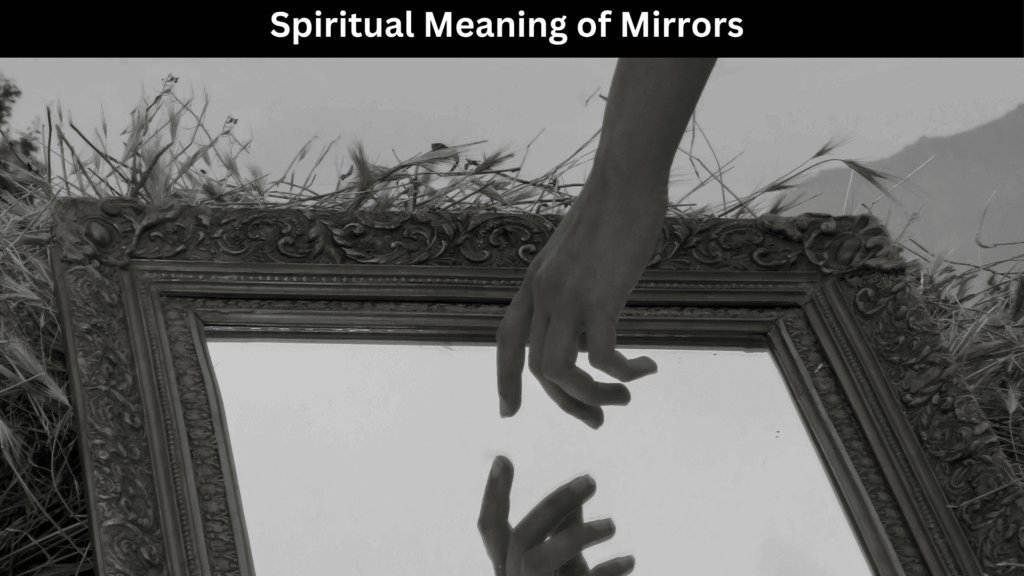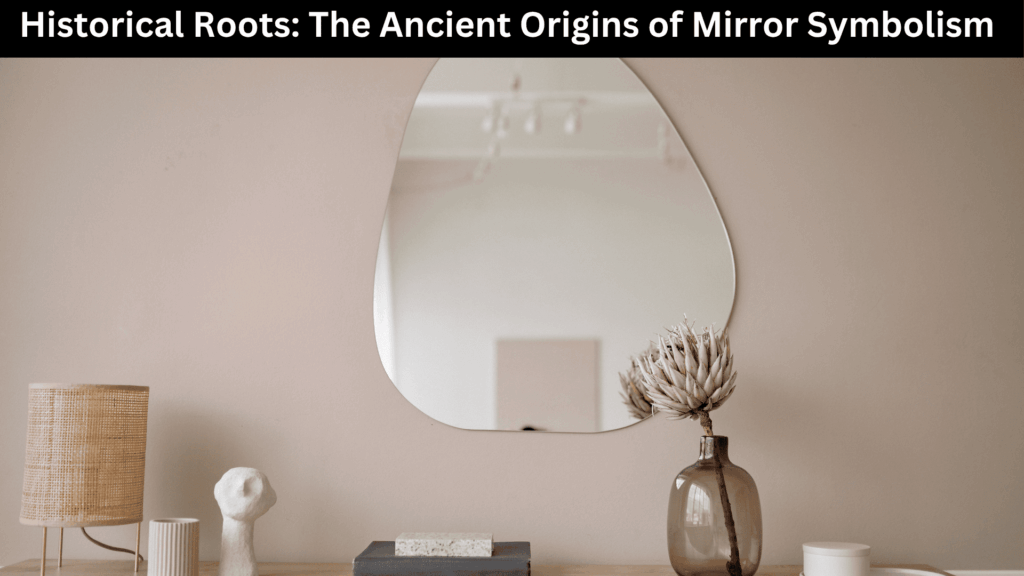The Profound Spiritual Meaning of Mirrors: 15 Hidden Truths About Reflection and the Soul
Discover the Spiritual Meaning of Mirrors and how reflection, energy, and self-awareness intertwine to reveal deep truths about your soul’s journey and spiritual growth.
The Mysterious Allure of Mirrors in Spiritual Thought

Since the dawn of civilization, humans have gazed into mirrors—seeking not just their physical reflection, but something more elusive, more profound: a glimpse into their inner being. The spiritual meaning of mirrors has long fascinated philosophers, mystics, and dreamers alike. From ancient obsidian mirrors to modern vanity glass, these objects have symbolized truth, illusion, and the boundary between the physical and spiritual worlds.
To many, a mirror is not merely a reflective surface but a metaphorical doorway—a threshold that bridges the visible with the invisible. It reflects not only faces but also emotions, energies, and consciousness. In the spiritual sense, looking into a mirror can be a sacred act of introspection, a confrontation with one’s essence. The mirror becomes a silent teacher, showing us what we often refuse to see: the truth behind our masks.
Historical Roots: The Ancient Origins of Mirror Symbolism

Before mirrors were made of glass, they were born from polished metals and black obsidian stones—tools used by priests and oracles to commune with the divine. In ancient Egypt, mirrors were linked to the goddess Hathor, who represented beauty and renewal. The Chinese viewed mirrors as protectors, capable of warding off evil spirits, while the Greeks used them in catoptromancy, a form of divination involving reflection.
Across time and culture, the mirror became a spiritual artifact, a vessel for truth and foresight. The transition from bronze disks to clear glass mirrors represented more than technological evolution—it mirrored the human journey toward inner clarity. As humanity refined its tools of reflection, it refined its understanding of the soul itself.
Mirrors as Portals: Bridging the Physical and Spiritual Realms
Throughout folklore, mirrors have been viewed as mystical gateways—portals to other planes of existence. Some traditions teach that mirrors reflect not only light but also spiritual energy, allowing communication with higher beings or ancestral spirits.
Stories abound of mirrors revealing ghostly figures or alternate realities, hinting at dimensions beyond the eye’s perception. In metaphysical thought, this idea suggests that mirrors thin the veil between the seen and unseen, making them sacred spaces for ritual and meditation.
When you stand before a mirror, you’re not just seeing your reflection—you’re facing your energetic imprint, your aura shimmering through glass. In this sense, a mirror isn’t passive; it’s an active participant in the dance between matter and spirit.
Self-Reflection and Inner Awareness: The Mirror as a Teacher
The mirror, in spiritual practice, is a profound tool for self-awareness. When you stare into your own eyes long enough, you might begin to see beyond features—to the emotions, stories, and energies beneath. This act of mirror gazing, or specular meditation, has been used by mystics to achieve deep spiritual insight.
The mirror asks uncomfortable questions: Who are you without the façade? What truths lie hidden behind your eyes? Facing your own reflection requires courage, for it often reveals both light and shadow. But through that reflection, the soul learns humility, compassion, and self-acceptance.
In the stillness of your gaze, the mirror becomes a teacher of truth—a spiritual mentor reminding you that the divine resides not in distant heavens, but within your own reflected eyes.
The Dual Nature of Mirrors: Light and Shadow in Reflection

Mirrors are paradoxical: they reveal truth while also creating illusion. They show us the visible form but conceal the intangible essence. This duality makes the mirror a powerful symbol of balance—light and darkness, clarity and distortion, perception and reality.
Spiritually, this reminds us that truth and illusion coexist within us. Just as a mirror can distort depending on its shape or angle, our minds can warp spiritual perception through fear, pride, or ego. Learning to see clearly means learning to discern reflection from reality—to accept both what is beautiful and what is flawed.
In embracing the mirror’s duality, we learn that every reflection—whether flattering or frightening—is an invitation to deeper spiritual clarity.
Mirror Superstitions and Spiritual Practices Around the World
Why is breaking a mirror said to bring seven years of bad luck? This superstition stems from the ancient belief that mirrors held fragments of one’s soul energy. Shattering a reflection was thought to wound the spirit itself.
In Japan, mirrors are sacred objects representing purity and truth. In Hindu rituals, mirrors are placed before deities to symbolize divine reflection—the universe mirrored within the self. Many cultures use mirrors in protection magic, believing they repel negative forces by reflecting them back to their source.
From the West’s folklore of vampires casting no reflection to China’s belief in mirrors that scare away malevolent spirits, one thing is certain: throughout time, mirrors have been revered as guardians of energy and truth.
Mirrors and the Concept of the Soul: Seeing Beyond the Surface
In spiritual philosophy, the mirror often symbolizes the soul’s window. Some say when you look deeply into your reflection, you are glimpsing your true essence—the infinite consciousness observing itself.
Many mystics believe that mirrors can reveal the aura, the vibrational energy surrounding a person. When used intentionally, a mirror can help align your physical and spiritual states, fostering harmony between body and soul.
This concept resonates with the ancient Hermetic principle: “As above, so below; as within, so without.” The mirror doesn’t lie—it shows what your energy already knows.
Mirrors in Dreams: Spiritual Interpretations and Symbolic Meanings
Dreaming of mirrors carries profound spiritual significance. To see your reflection often symbolizes self-evaluation or awareness of hidden emotions. If the reflection appears distorted, it might represent confusion or self-deception.
Dreaming of a mirror that shows another person’s face may suggest spiritual guidance or ancestral presence—a visitation from beyond. Broken mirrors in dreams typically indicate transformation, a shattering of old self-images to make way for renewal.
Dream mirrors are messages from your subconscious, asking: Are you seeing yourself clearly?
The Mirror and the Law of Attraction: Manifestation and Reflection
The Law of Attraction teaches that the energy you emit mirrors back into your reality. Similarly, the mirror symbolizes this principle of energetic reciprocity—you attract what you project.
When you smile into a mirror, it smiles back. When you frown, it returns your sorrow. The same applies to the universe. This is why mirror work, popularized by spiritual teachers like Louise Hay, uses affirmations in front of a mirror to reprogram the subconscious mind.
By gazing at your reflection and declaring positive truths—“I am worthy, I am loved, I am whole”—you shift your vibrational frequency. The mirror becomes a sacred partner in manifesting the reality you desire.
Feng Shui and Energy Flow: The Spiritual Placement of Mirrors
In Feng Shui, mirrors are known as “the aspirin of energy”—able to heal, reflect, or redirect chi (life force). When placed correctly, they can expand space, invite abundance, and amplify positive energy.
However, Feng Shui warns against mirrors facing beds or doors, as they may disrupt rest or scatter energy. Mirrors should instead face pleasant views or light sources, symbolizing clarity and flow.
Cleansing mirrors regularly and using them with intention ensures that they serve as conduits of harmony and prosperity, not chaos.
Mirrors in Religion and Mythology: Sacred Reflections of the Divine
The sacred mirror appears throughout world religions. In Hinduism, the mirror symbolizes maya—the illusion of reality—reminding believers that the material world reflects divine consciousness. In Buddhism, the mirror represents enlightened mind: clear, reflective, and unclouded by desire.
In Christianity, St. Paul wrote, “For now we see through a glass, darkly; but then face to face.” This suggests that earthly perception is but a dim reflection of divine truth.
Greek myths, too, weave mirrors into moral tales: Narcissus, entranced by his reflection, reminds us of the danger of ego; Perseus, using a mirror-like shield, shows the power of truth seen indirectly.
The Psychological Mirror: Inner Healing and Shadow Work

The mirror’s spiritual symbolism extends into psychology. In Jungian thought, mirrors represent the confrontation with the shadow self—the hidden aspects of personality we often deny.
Mirror gazing, when done mindfully, becomes a practice of self-compassion. Instead of judging the reflection, you begin to see yourself with forgiveness and curiosity. This spiritual healing process can release guilt, shame, and fear—making room for authenticity.
In this sense, every time you look into a mirror, you’re not seeing a static image but a living dialogue between who you are and who you’re becoming.
Cleansing Mirror Energy: Spiritual Practices and Rituals
Like any energetic object, mirrors can absorb and store vibrations—both positive and negative. Cleansing them is essential to maintain spiritual purity.
You can use methods such as:
- Wiping mirrors with salt water to neutralize dense energy
- Burning sage or incense nearby to purify the surrounding aura
- Exposing the mirror to moonlight for spiritual renewal
Many practitioners also speak affirmations or blessings during cleaning, reaffirming the mirror’s role as a channel of light, not shadow.
The Mirror as a Symbol of Truth and Enlightenment
In its purest form, the mirror is a metaphor for truth—it neither flatters nor deceives. Spiritually, it invites enlightenment by reflecting reality without distortion.
To “see clearly” in the mirror is to recognize your divine nature. This awakening dissolves illusion and ego, leaving only awareness—the mirror of the soul itself.
Mirrors teach us that truth isn’t something to seek elsewhere; it’s what stares back when we finally dare to look within.
Modern Spirituality: The Role of Mirrors in Today’s Mindful Living

In today’s mindfulness movement, mirrors are reemerging as tools for emotional healing and empowerment. Mirror affirmations help people cultivate self-love, gratitude, and confidence.
Practices like mirror gazing meditation reconnect individuals to their intuition and spiritual essence. Even interior design uses mirrors not just for aesthetics but to create energetic flow in homes and workspaces.
In a noisy world, the mirror remains a silent ally—reminding us to pause, breathe, and witness ourselves with honesty and grace.
FAQs
What does it mean spiritually if a mirror breaks?
Breaking a mirror symbolizes the end of a cycle or transformation. It may represent the breaking of illusions or the need to rebuild spiritual clarity.
Can mirrors trap or release energy?
Yes. Mirrors can reflect, store, or amplify energy depending on how they are used and cleansed. Intentional spiritual use keeps their vibration positive.
How can I use mirrors for spiritual protection?
Place mirrors near entryways to reflect negative energy outward. You can also visualize light surrounding the mirror as a shield.
Why do I feel uneasy looking into a mirror sometimes?
This discomfort often arises from energetic confrontation—your soul sensing emotional truths or unresolved energies surfacing.
Is it true that mirrors can reflect spirits or auras?
Many spiritual traditions believe so. Mirrors are thought to reveal subtle energies, including auras, when used with focused intention.
How do I cleanse a mirror of negative spiritual energy?
Use moonlight, salt water, or sage smudging, and affirm aloud: “This mirror reflects only truth, love, and light.”
Conclusion
Mirrors are not just objects—they are soul companions. They remind us that every reflection, every gaze, is an opportunity for awakening. When you look into a mirror, you’re not merely seeing yourself—you’re meeting your soul, the spark of divinity within.
To embrace the spiritual meaning of mirrors is to walk a path of self-discovery. It is to recognize that the external reflection is merely the surface of an infinite ocean within.




